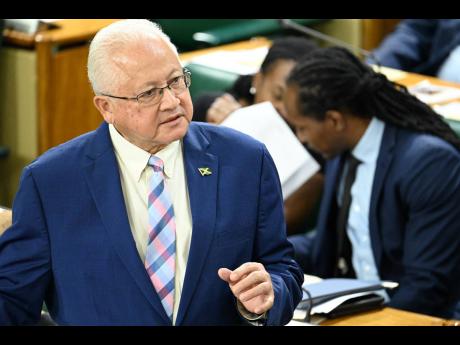‘Hang dem, Delroy’
Montague firm on executing juveniles who kill as Chuck outlines sentencing recommendations for murder
Backbencher Robert Montague has scoffed at proposals for longer prison sentences for juveniles, insisting any punishment short of hanging would be a “waste of time”.
On Tuesday, Montague persisted with a stream of sotto voce comments of “hang dem, Delroy” in the House of Representatives as Justice Minister Delroy Chuck opened the debate on penalties for capital and non-capital murders.
Chuck opened the debate on the report submitted by the joint select committee (JSC) of Parliament – which reviewed the Criminal Justice Administrative Amendment Act 2023, the Offences Against the Person Act 2023 and the Child Care and Protection Act 2023 – telling colleague legislators that the country had, over the last 20 years, recorded in excess of a thousand murders annually.
“We, as a parliament, must do everything in our powers to see how we can control the behaviour of our people to reduce murders to tolerable levels,” Chuck argued.
Send a signal
The justice minister said that, while the proposals from the committee by themselves cannot solve Jamaica’s out-of-control murder problem, they are intended to send a signal that murderers who are convicted will serve lengthy sentences.
He challenged that, if the sentences for murders are not proportionate, the families of victims are likely to retaliate.
“This Parliament must reflect and balance what is justice, not only for the offender, but also for the victims who can’t speak,” said Chuck.
The JSC has recommended that the sentence for capital murder remain death or life imprisonment and, where the latter is imposed, a minimum of 50 years must be served before consideration for parole.
Currently, where a life sentence is imposed, a convicted killer must serve at least 20 years before becoming eligible for parole.
For non-capital murder, the present position is life imprisonment or a fixed term of imprisonment. Where a life sentence is imposed, the offender must serve at least 15 years before consideration for parole. For a fixed term, the offender must serve at least 10 years before eligibility for parole.
Chuck told the House that the consensus and position of the JSC is that the murderer must serve at least 40 years behind bars where a life sentence for non-capital murder is imposed before being eligible for parole.
The JSC wants offenders to be sentenced to not less than 30 years in prison where a fixed term of imprisonment is imposed and for them to serve at least 20 years before being eligible for parole.
“These sentences should be harsh; should be severe so that persons who contemplate murder must recognise that if they engage in murder, they don’t have much of a future in the society,” said Chuck.
He said that, in instances where murders are not premeditated, such as most domestic-related cases, where the offenders plead and are prepared to plead guilty, the aforementioned sentences do not readily apply.
Chuck said that, once they plead guilty, they can negotiate under the Criminal Justice (Plea and Negotiations) Act and an appropriate sentence, after the family and friends of the victim are considered, will be decided by the judge.
At the same time, he said significant issues were raised during meetings of the JSC when the sentences for child murderers came to the fore.
Currently, the sentence of a child murderer who is under the age of 14 years is left up to a judge but that time in custody must not exceed 25 years. This provision is to be maintained.
For children between the ages of 14 and 17 who commit murders, they are sentenced like adults. The minister said it is recommended that these children who commit capital murders not be sentenced to death but to life imprisonment or a fixed term for 50 years. They must serve at least 20 years before being considered for parole.
Chuck said that, in instances where a child aged 14 years and older has committed a non-capital murder, the JSC has proposed that they are sentenced to a term of not less than 30 years and must serve at least 15 years before being considered for parole.
Chuck said the committee wrestled with the idea of the sentences for children, noting that they are of tender age and need help and are to be given special considerations.
“But the truth of the matter is these children 14 to 17 are committing some serious crimes and they are killing children of a similar age and even adults. The question is, if this Parliament fails to send a signal that these children should have a harsh penalty, if we fail to do that, I urge the families of the victims will feel they got no justice,” Chuck said, adding that they will find “ways and means” to retaliate.
However, while Chuck argued why the sentences for child murderers must send a strong message, Montague inadvertently dismissed them, calling for them to be hanged in an off-mic comment.
“No, we are not going to hang them,” Chuck rebutted.
But Montague doubled down on his position.
“I’ll be the first to tell you I don’t believe in hanging,” Chuck responded.
However, Montague fired back, repeating several times, “Well, yuh only a waste yuh time then.”
Later on, Montague opened his mic, against the Speaker’s wishes, telling the House that he had strong views and that murderers must be hanged.
His mic was subsequently muted.

